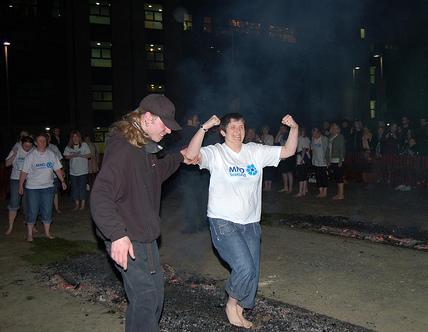Men are not prisoners of fate, but only prisoners of their own minds. – Franklin D. Roosevelt

Have you ever done this? Watching the coals heat the rakes and shovels to red-hot is always a fun part of the experience. But with proper preparation, you are not predestined to medium-well feet. Just don't do it unprepared!
What does that mean?
This quote is a denouncement of predestination. It says quite clearly that we are not prisoners of fate. We are not the victims of whatever has been decided by who or whatever decides these things. While our actions often have predictable consequences, our actions are our own to choose.
The quote finishes by stating that the people who feel that fate is in control are not prisoners of fate, but prisoners of their own minds. They act, or fail to act, as they do because of their belief in fate. However, the only thing that truly is set is their attitude, because of their belief.
Why is freedom (free will) important?
This is a fun concept (in theory), sometimes examined in Science Fiction stories. The concept goes something like this: If everything is predestined, why try? What can you do that hasn’t already been decided. So just sit around, cry in your beer, and allow your fate to overtake you. Sounds like the perfect setting for a dystopia, doesn’t it?
If you do that in the real world, it’s going to suck to be you. If a whole country does it, things just fall apart. No one is doing much of anything, just the bare minimum to survive. Imagine a school where everyone thinks they’re predestined to get a D for a grade. How much effort and work will be done in that classroom? Not a very pretty picture, is it?
Where can I apply this in my life?
I don’t want to get into a great debate about predestination and free will. People far brighter than I have devoted decades of their lives looking into these topics and a small library could be filled with their books. I am far more interested in how we can apply the concept of free will to our daily life, even if it really is just an illusion. 8)
FDR said this quote in the Spring of 1939, as the US was starting to show some signs of recovery after the terrible decade of the Great Depression. He needed to inspire people who were feeling beaten down by a decade of bad news, a decade of hardship, a decade of failure. Many had given up hope and were just doing enough to survive. If the country was to ever thrive again, people had to start believing in themselves, and be ready to take action.
What would you do if you believed you couldn’t fail? It sounds a little silly, I know, but many people spend their life believing they shouldn’t even try something because they know that they will fail. This question is simply the opposite of the dismal certitude of failure.
Let’s tone down the optimism a bit, and ask instead “What would you do if you knew that eventually, after some trials and tribulations, achieve your goal?” Would you learn a new language, or are you predestined to be a monoglot for the rest of your life? Would you take up dancing, even with two left feet, or are you fated to be a wall-flower for the rest of your life?
Grab some paper and write down three things you have always wanted to do but hadn’t because you thought you could never do THAT! Fire walking, sky diving, and performing with (minor) rock stars were on my list. I’m going to need a new list! How about you, what’s on your list? If you understand that there will be failures along the way, but that you can succeed if you are willing to keep trying, which one do you want to do first?
In my case, each took some time, both to prepare myself, and to find the proper opportunity. Start by figuring out what you need to do to be ready for this event. How long will that take, and what resources will it require? Write those things down, so you have a record of your thoughts.
Now, start brainstorming ideas about how to get to that point. Select the idea or path that seems best suited to your present situation, your strengths and your limitations. All that is left is to put together a high-level plan for the over-all project, and add some details for the first few steps. Don’t go too far into the future with the planning, as things will inevitably change, and being flexible in your plan will be important.
Once you have the plan for the first few steps, it’s time for action. Take the first step. Even if it’s something small, start working the plan. Up to this point, it’s been an interesting intellectual exercise, predestined to failure without action. Do something. Make a phone call, talk to someone who has done this, do some research, something (anything) to start helping yourself believe it is going to happen. Then keep at it.
While you might suffer a setback or two along the way, you know you will get there if you just keep adjusting your approach, working hard, and believing in yourself. A journey of a lifetime starts with a step. It continues step after step after step. You can only fail if you stop taking steps, right?
From: Twitter, @tonyrobbins
confirmed at : http://www.brainyquote.com/quotes/quotes/f/franklind130048.html
Photo by Ross_Goodman






